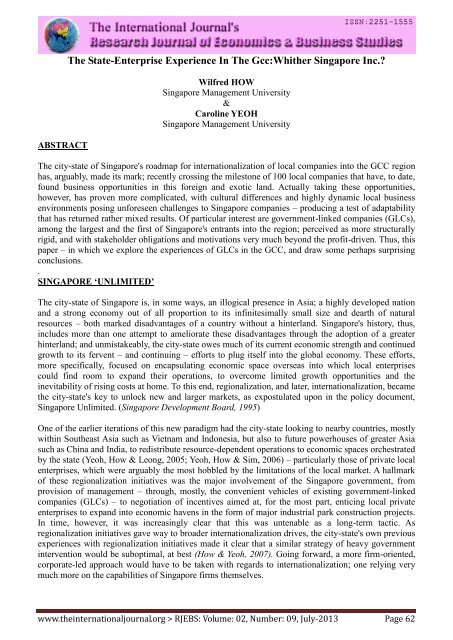Research Journal of Economics & Business Studies - RJEBS - The ...
Research Journal of Economics & Business Studies - RJEBS - The ...
Research Journal of Economics & Business Studies - RJEBS - The ...
You also want an ePaper? Increase the reach of your titles
YUMPU automatically turns print PDFs into web optimized ePapers that Google loves.
ABSTRACT<br />
<strong>The</strong> State-Enterprise Experience In <strong>The</strong> Gcc:Whither Singapore Inc.?<br />
Wilfred HOW<br />
Singapore Management University<br />
&<br />
Caroline YEOH<br />
Singapore Management University<br />
<strong>The</strong> city-state <strong>of</strong> Singapore's roadmap for internationalization <strong>of</strong> local companies into the GCC region<br />
has, arguably, made its mark; recently crossing the milestone <strong>of</strong> 100 local companies that have, to date,<br />
found business opportunities in this foreign and exotic land. Actually taking these opportunities,<br />
however, has proven more complicated, with cultural differences and highly dynamic local business<br />
environments posing unforeseen challenges to Singapore companies – producing a test <strong>of</strong> adaptability<br />
that has returned rather mixed results. Of particular interest are government-linked companies (GLCs),<br />
among the largest and the first <strong>of</strong> Singapore's entrants into the region; perceived as more structurally<br />
rigid, and with stakeholder obligations and motivations very much beyond the pr<strong>of</strong>it-driven. Thus, this<br />
paper – in which we explore the experiences <strong>of</strong> GLCs in the GCC, and draw some perhaps surprising<br />
conclusions.<br />
.<br />
SINGAPORE ‘UNLIMITED’<br />
<strong>The</strong> city-state <strong>of</strong> Singapore is, in some ways, an illogical presence in Asia; a highly developed nation<br />
and a strong economy out <strong>of</strong> all proportion to its infinitesimally small size and dearth <strong>of</strong> natural<br />
resources – both marked disadvantages <strong>of</strong> a country without a hinterland. Singapore's history, thus,<br />
includes more than one attempt to ameliorate these disadvantages through the adoption <strong>of</strong> a greater<br />
hinterland; and unmistakeably, the city-state owes much <strong>of</strong> its current economic strength and continued<br />
growth to its fervent – and continuing – efforts to plug itself into the global economy. <strong>The</strong>se efforts,<br />
more specifically, focused on encapsulating economic space overseas into which local enterprises<br />
could find room to expand their operations, to overcome limited growth opportunities and the<br />
inevitability <strong>of</strong> rising costs at home. To this end, regionalization, and later, internationalization, became<br />
the city-state's key to unlock new and larger markets, as expostulated upon in the policy document,<br />
Singapore Unlimited. (Singapore Development Board, 1995)<br />
One <strong>of</strong> the earlier iterations <strong>of</strong> this new paradigm had the city-state looking to nearby countries, mostly<br />
within Southeast Asia such as Vietnam and Indonesia, but also to future powerhouses <strong>of</strong> greater Asia<br />
such as China and India, to redistribute resource-dependent operations to economic spaces orchestrated<br />
by the state (Yeoh, How & Leong, 2005; Yeoh, How & Sim, 2006) – particularly those <strong>of</strong> private local<br />
enterprises, which were arguably the most hobbled by the limitations <strong>of</strong> the local market. A hallmark<br />
<strong>of</strong> these regionalization initiatives was the major involvement <strong>of</strong> the Singapore government, from<br />
provision <strong>of</strong> management – through, mostly, the convenient vehicles <strong>of</strong> existing government-linked<br />
companies (GLCs) – to negotiation <strong>of</strong> incentives aimed at, for the most part, enticing local private<br />
enterprises to expand into economic havens in the form <strong>of</strong> major industrial park construction projects.<br />
In time, however, it was increasingly clear that this was untenable as a long-term tactic. As<br />
regionalization initiatives gave way to broader internationalization drives, the city-state's own previous<br />
experiences with regionalization initiatives made it clear that a similar strategy <strong>of</strong> heavy government<br />
intervention would be suboptimal, at best (How & Yeoh, 2007). Going forward, a more firm-oriented,<br />
corporate-led approach would have to be taken with regards to internationalization; one relying very<br />
much more on the capabilities <strong>of</strong> Singapore firms themselves.<br />
www.theinternationaljournal.org > <strong>RJEBS</strong>: Volume: 02, Number: 09, July-2013 Page 62
















